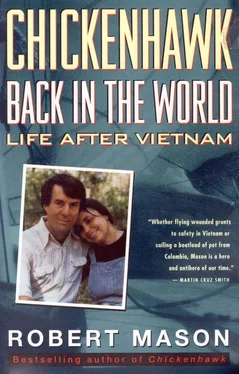Robert Mason - Chickenhawk - Back in the World - Life After Vietnam
Здесь есть возможность читать онлайн «Robert Mason - Chickenhawk - Back in the World - Life After Vietnam» весь текст электронной книги совершенно бесплатно (целиком полную версию без сокращений). В некоторых случаях можно слушать аудио, скачать через торрент в формате fb2 и присутствует краткое содержание. Год выпуска: 2013, Издательство: BookBaby, Жанр: Старинная литература, на английском языке. Описание произведения, (предисловие) а так же отзывы посетителей доступны на портале библиотеки ЛибКат.
- Название:Chickenhawk: Back in the World - Life After Vietnam
- Автор:
- Издательство:BookBaby
- Жанр:
- Год:2013
- ISBN:нет данных
- Рейтинг книги:3 / 5. Голосов: 1
-
Избранное:Добавить в избранное
- Отзывы:
-
Ваша оценка:
- 60
- 1
- 2
- 3
- 4
- 5
Chickenhawk: Back in the World - Life After Vietnam: краткое содержание, описание и аннотация
Предлагаем к чтению аннотацию, описание, краткое содержание или предисловие (зависит от того, что написал сам автор книги «Chickenhawk: Back in the World - Life After Vietnam»). Если вы не нашли необходимую информацию о книге — напишите в комментариях, мы постараемся отыскать её.
Chickenhawk: Back in the World - Life After Vietnam — читать онлайн бесплатно полную книгу (весь текст) целиком
Ниже представлен текст книги, разбитый по страницам. Система сохранения места последней прочитанной страницы, позволяет с удобством читать онлайн бесплатно книгу «Chickenhawk: Back in the World - Life After Vietnam», без необходимости каждый раз заново искать на чём Вы остановились. Поставьте закладку, и сможете в любой момент перейти на страницу, на которой закончили чтение.
Интервал:
Закладка:
Who knows if it was true? It was exactly what we wanted to hear.
We heard they were coming a week before they got there. People were talking in the chow line. Four guys were coming to Eglin. A sheriff from a county jail and three of his deputies. Rumor said these guys were convicted of depriving a couple of black guys of their civil rights by beating them to death at the jail they ran.
Wait! Everybody was saying. You can’t let murderers into Eglin! This is a nice camp! A hack told me the bureau was sending them here because they knew they’d be killed in a real prison.
The day they arrived, the Eglin wimps were prepared. The guys in the clothing room made sure that their pants were short enough to look like knickers, their shirts were too small to button, and their shoes were the oldest, foulest pairs they could find. The new prisoners walked into prison looking like they’d fallen into a vat of some chemical that shrank all their clothes and rotted their boots. They also looked very nervous. By dinner they couldn’t go anywhere without somebody pointing them out. One black guy ran up to the ex-sheriff in a dorm hallway. “You like to kill niggers? Well, kill me, motherfucker!” he yelled, jabbing his chest with his thumb. “C’mon. Kill me!” He glared at the ex-sheriff, and the ex-sheriff shrank up against the wall, petrified. The black guy shook his head in disgust and said, “Damn!” The ex-sheriff slinked away.
The ex-sheriff had nothing to worry about. Nobody at Eglin would actually hurt him and his deputies. We pecked at them, true, but it was like being pecked by ducks. For a few weeks the former cops couldn’t get new clothes or shoes until the staff came over and made us issue decent stuff. Okay, the clothing room gang said, they have good clothes. Try wearing them! Ha! They sprinkled fiberglass insulation into their underwear and “lost” the rest of their laundry. Every time their laundry came back from the base, the clothing room team just sent it right back. After a month of petty harassment, everybody lost interest. Eglin inmates were a real disappointment if you were looking for really nasty crooks. Eventually the cops were left alone. Nobody would talk to them, but they weren’t harassed, either. They were lucky.
Actually, I think there was another murderer at Eglin, but I can’t be sure. He was there for income tax evasion. Jules worked internationally, knew a lot about hiding money. He seemed a very friendly man, knowledgeable about intriguing criminal matters and willing to talk. I enjoyed our conversations. I mentioned something about how hard it was to get the seed money for the kinds of banking crimes with which Jules was involved.
“It’s not hard, Bob.” Jules said. We were walking beside the beach, on the jogging trail.
“C’mon,” I said. “You say you need a few million dollars. How can a person get that kind of money together?”
Jules nodded, looked at me seriously. “If you are willing to do what has to be done, then it is easy.”
“Yes?” I said. The way he said it made me wonder if I wanted to hear the rest.
“Yes. I’ve been busted before, Bob. Ten years ago, when I got out of prison, I was flat broke. A year later I had five million dollars in a bank in Austria.”
I laughed nervously. “What’d you do? Rob a bank?”
“Exactly,” Jules said.
“C’mon,” I said. “That never works.”
“It is child’s play. Do you want to know how?” Jules and I were at the lonely stretch of the trail, beside the swamp. The feral cats watched us. Jules’s tone of voice made my skin crawl.
“Why would you tell me? I might write it down someday.”
“Fine. Do it. You don’t know if I’m lying.”
“Are you lying?”
“No.”
I shrugged. There is no way out of a cycle like this. It’s an example of a self-referential conundrum I’d been reading about, like: “This sentence is false.”
“You walk into the bank, after you have found out who is the president, and—”
“You’re telling me how?”
“Yes. It’s part of the real world, Bob. In the real world power rules. Powerful people take what they want.”
I saw John Tillerman in the weight shack. He was bench pressing a very large set of weights. He didn’t see me. “You promise me you’re lying, and I’ll listen.”
“Everything I am telling you is a lie,” Jules said.
“Tell me.”
“You know who the banker is, you know where he lives. You have grown a full but distinguished beard, dyed your hair. As you walk in the front door of the bank, your two partners are inside his house, with his family. When the secretary asks your business, you give her an envelope to give to the president, an envelope with a picture of his wife and kids. A minute later the secretary says he will see you.
“When you are sitting together, in his office, discussing how much money you want, you suggest he call home. He does. One of your partners answers.”
We passed the bocci courts. We were once again skirting the swampy side of the camp. Long shadows of sunset enclosed us.
“The banker is not a power person. When your partner answers, the banker is pissing in his pants. He makes a couple of calls. A clerk delivers the money, gives it to the ‘important client’ in the office. You pack it carefully in your briefcase.”
“What keeps him from calling the police when you leave?”
“He leaves with you. He is going to lunch with the important client.”
“Where do you go?”
Jules smiled slightly. “Fishing.”
I nodded, quickly. Why did I know what that meant? “The family?”
“Nothing. You are not a brute. They know nothing. They have been with two men wearing ski masks for a couple of hours.”
I nodded. We walked in silence.
“It is shocking to you? This real world?”
“I’ve seen people killed. Women and children have died because of me. That’s real. I’ve just never met anyone who’d kill in cold blood, except in war—that’s not … well, it has a purpose. I’d be shocked, if I thought you were telling the truth,” I said, staring at Jules.
Jules laughed, but his smile wasn’t happy. “Yes. Luckily, nothing like that really happens.”
I turned away from Jules and shrugged.
“Isn’t that nice?” Jules said.
One morning, out of the blue, Baker told me that Grumbles the commissary clerk was leaving in a week and Miss Reed wanted me to come work for her. “I’d really like you to stay, Bob. You know how to do everything around here. But Miss Reed has a lot of clout with administration. I think she can get you even if I don’t agree.” Baker leaned back in his big executive chair and rested his chin on his fists. “I’ve talked to her about it, and the deal is that it’s up to you. You say you want to go, and I’ll agree. You want to go?”
Baker was pulling my strings. It wasn’t that he was dependent on me, personally; he just dreaded the hassle of finding somebody to take my place. “Well, Mr. Baker. I like working here—”
“Good—”
“—but I wouldn’t mind a change, you know?”
Baker looked very sad. “Who’s going to take your place?” he said.
I thought for a minute. “Well, we got that new guy, Winkler, the college professor?” Winkler, a tenured professor, was sent to Eglin, he said, over a three-hundred-dollar discrepancy in his tax return. He claimed he made a mistake, deducted the same business trip twice, but the government chose to prosecute. He got a year, would serve eight months. Because he wasn’t able to honor his teaching contract, he lost his job and his tenure. He was collecting stories about how people get into places like Eglin.
“Winkler? The shrink?”
“He’s a psychologist. Anyway, he can type great—good as me. He’s just being wasted now.”
Читать дальшеИнтервал:
Закладка:
Похожие книги на «Chickenhawk: Back in the World - Life After Vietnam»
Представляем Вашему вниманию похожие книги на «Chickenhawk: Back in the World - Life After Vietnam» списком для выбора. Мы отобрали схожую по названию и смыслу литературу в надежде предоставить читателям больше вариантов отыскать новые, интересные, ещё непрочитанные произведения.
Обсуждение, отзывы о книге «Chickenhawk: Back in the World - Life After Vietnam» и просто собственные мнения читателей. Оставьте ваши комментарии, напишите, что Вы думаете о произведении, его смысле или главных героях. Укажите что конкретно понравилось, а что нет, и почему Вы так считаете.












